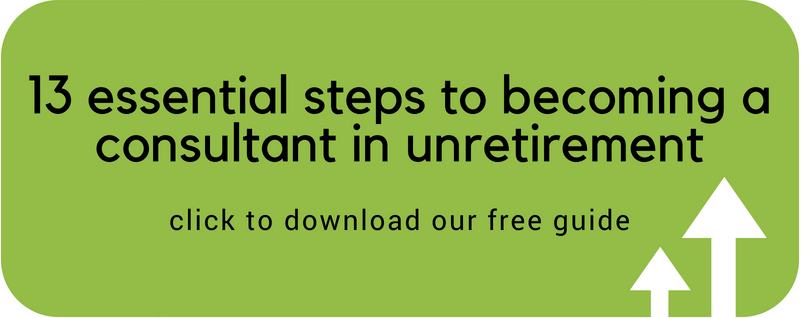8 steps to staying young and relevant in unretirement
16 May 2018 By Victoria Tomlinson

In our opinion, there’s no ‘one-size-fits-all’ answer to the question of what to do in unretirement. For some time now, we’ve been helping people to find purpose in, and enjoy, their ‘unretirement’ which usually involves using their skills in a new way such as becoming a consultant, starting a business, becoming a trustee or mentoring others.
One of our clients recently talked to us about having left corporate life and becoming a consultant. Just three years later, he is starting to feel out of touch with current language, trends, law and more.
He specifically mentioned two things that were referenced in a workshop he ran – one was a new buzzword, the other a pretty critical piece of legislation that had simply passed him by.
They weren’t a big deal, but he was conscious that when you don’t have a corporate structure around you, endless emails warning and briefing you, or those water cooler moments chatting to colleagues, you can start feeling disconnected. Who would have thought you might long for emails on the latest legislation!
This can lead to a lack of confidence in using your skills in unretirement – whether helping charities or finding paid roles, whatever they are.
So it set me thinking. How can you stay young in mind, up-to-date and relevant once you have left your full-time working career? While I am looking at this as an ‘unretirement’ issue for people wanting to use their skills, it is something we all need to consider if we want to stay in tune with our children, grandchildren and society generally.
If you look at these dates when various tech platforms started – they each became everyday language well within five years of starting. It makes the point how quickly things change these days.
1998 – Google
2002 – LinkedIn
2004 – Facebook
2006 – Twitter
Can you believe Google is only 20 years old?
The pace of change is on an exponential curve. This Forbes article argues that rapid technological change is the biggest threat to global business, and looks at the challenge that businesses face to stay abreast of technology. However, I think there is just as big a threat to people and society if technology excludes them.
This weekend, I had a pub lunch with my husband and we came up with a list of what our generation needs to do to stay young. Here is our list but we’d love to hear your ideas.
1. Don’t ask others to sort your tech problems
There was a great article last year about the things that teenagers say REALLY annoy them about their mothers. This particular point stayed with me.
Joe Lawrence, 17, said this of his mother Sue: “I don’t find it annoying that you’re utterly clueless when it comes to downloading a film onto the TV or configuring a new mobile phone, it’s the fact you won’t even try to learn. You’re not stupid, but you deliberately act like you are just so I will do it for you. Gushing ‘what a clever lad’ I am doesn’t make it any better.”
So the first tip – make an effort to learn how to use technology yourself.
2. When something annoys you – ask, is this a young way of thinking?
I regularly travel to London on Virgin Trains. In the WC, there is writing across the mirror saying ‘Go on, give us a smile’. As I look around, often the floor is wet, the train isn’t brilliantly clean and the dryer doesn’t work. So this notice really irritates me and I conclude that it has been done by a bunch of young people working in marketing, thinking, ‘how do we make the journey really cool?’.
And this is the point. As we get older, we have so much experience to draw on and we can get critical when things miss the mark. But these youngsters were just trying to make our journey fun. So now when I use these facilities, I make myself think of these cool kids in a cool office, starting on their own journey of understanding what works. And doesn’t.
3. Spend time with younger people in unretirement
One of the challenges of leaving a full time career is that you probably need to build new networks. Make sure some of these are with young people. You could go into schools, mentor troubled young people, advise start-up businesses and more.
4. Get out of your comfort zone
Years ago, I heard Tim Smit of the Eden Project ( contemporary gardens and eco projects in Cornwall) give his tips on creating an innovative and motivated workforce. One of his rules was that all his managers had to go to some kind of cultural event outside their comfort zone once a year – and write a great review.
You can get a lot out of keeping an open mind – doing the unexpected can really surprise you as well as keep you young, particularly in unretirement.

5. Read the Saturday FT magazine
I know this is very specific, but I think the FT’s Saturday magazine is just brilliant. It constantly surprises and engages me on things I would never expect to enjoy reading. They are also particularly good at making technology easy to understand from wide perspectives.
You will have to subscribe for these articles, but honestly it is worth every cent or penny!
6. Start on social media
You will probably gather by now that I have a strong view on social media – if you are not yet active, you have to start. It is not going away and the longer you leave it, the more disconnected you are becoming.
A while ago, interviewed Dorthy Miller, one of the founders of Primewomen who started the business in her 60s. She said:
“I have to say I wasn’t very active in social media when I started this business, and so I assumed that other women weren’t either! Of course, I hadn’t made the link between social media and being found on Google searches. In the meantime social media has really taken off for this older, more professional generation.”
7. Build a community online
Building a community online was my husband’s suggestion and I love it. He thought it would be great to reconnect and build new networks in unretirement – it could be old university or college friends or even getting in touch with distant relatives. And you will definitely learn new skills by doing this and probably a lot of surprises!
8. Whatever you fear, do it
I am mostly thinking about the fear of tech here, but it probably applies much wider. If you are fearing something, just do it. People are even sky-diving at 90 years old these days. If we want to stay young, we are going to have to address our fears. Though I would rather not sky-dive.



